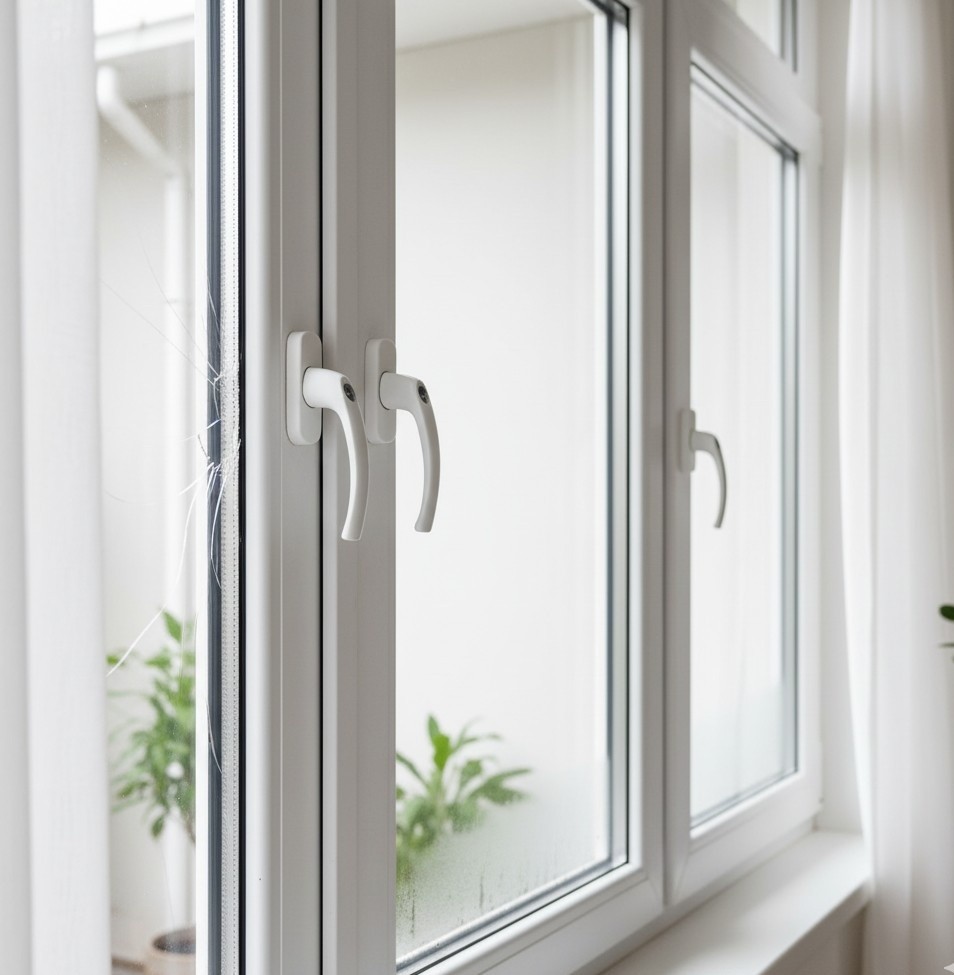Noticing cracking sounds or visible cracks in your uPVC windows? While uPVC is known for its durability and low maintenance, issues like frame cracking or unusual noises can still occur over time. These problems often result from temperature changes, poor installation, or material stress. Understanding the causes early can help you prevent damage, maintain energy efficiency, and extend the life of your windows.
Common Reasons for Cracking & Popping Sounds in uPVC Windows
1. Thermal Expansion and Contraction
The most common cause of both noises and cracks is temperature fluctuation. uPVC frames and glass expand in heat and contract in cold. Sudden changes—like turning on heating against a cold window—can put excessive stress on the material, leading to popping sounds or visible cracks.
2. Poor Installation
Incorrect installation can leave windows twisted, forced into place, or fitted too tightly. This improper alignment adds constant stress to the frame and glass, increasing the likelihood of cracking over time.
3. Building Settlement
As buildings naturally settle, structural shifts can place uneven pressure on window frames. This bending or twisting effect can cause frames to creak or eventually crack.
4. Impact Damage
Direct impacts—such as stones, debris, or accidental knocks—can easily create cracks in both the frame and glass, even if the window is otherwise well-maintained.
5. Age and Material Wear
Over the years, uPVC materials gradually weaken. Aging frames become less flexible and more prone to damage from daily stresses, making them susceptible to cracks and creaking noises.
Improper Window Installation
Popping sound, and cracking of windows can result from poor installation of windows. If a vinyl siding installed in a different frame, then the jamb aluminum siding of the frame can bend inward and pressure the window sashes.
Also, if there is edge damage to the inner panes (or poorly installed vinyl siding) of replacement windows, then that nick can spread slowly and increase over time. This would escalate the popping noises or popping sounds. Improper vinyl siding installation can cause a window frame cracking sound and loss of energy efficiency.
Weather Elements
If your home is located in an area where the temperature fluctuates too much during the day, then that can add to the stress of the glass material. Thermal stress is a root cause of glass expansion, and because the glass has no place to expand, this event causes the glass to shatter.
Windows made of low e glass are coated with a microscopically thin layer that is both transparent and reflective of heat.
To monitor these factors, you need to take in some other instances that can let you know whether your uPVC installation has failed.
What Should You Look For?
- Condensation
- Leaks
- Draughts
Condensation
Condensation in uPVC windows can be fixed by paying attention to different aspects of your home, such as the use of the room, the temperature of the inside and outside, the ventilation, and the number of people in the room.
In the case of ventilation, you can use a dehumidifier to reduce it. Although it is always best to have high-quality windows in your home to start with.
Leaks
If leaks are coming from the frame, then it could be that the weather seals in your window failed to block the drainage. The best way to deal with this situation is to replace the weather seals and keep the new windows clean in case of blockage. However, contacting the company that provided you with the windows is still better.
 Draughts
Draughts
Draughts mean that the seals in your window have broken down or have lost their elasticity over the years.
In the case of draughts, hiring a professional is your best option because you must fill the area between the wall and the frame to eliminate the cracks. You can get a free estimate first and then plan to get it fixed.
Plastic Does Expand on Warmer Days
Plastic has the property of swelling when exposed to high temperatures, which is one of its defining properties. Even if it’s just a tiny bit, temperature fluctuations will cause it to grow and shrink as time goes on. Does this imply that the same thing will occur with the PVCu double-glazed windows you set your heart on placing in your old house?
Existing Damages to the Pvcu Windows
The fact that PVCu windows may already have damage is one cause they perform poorly when exposed to extreme temperatures.
Suppose any of the components of your PVCu windows sustain damage. In that case, even if it is only mild scrapes or scratches on the windows or a small fracture in the frame, this may impair how effectively it can maintain its structural integrity in the face of adverse weather and climatic conditions.
Investing in double or even triple-glazing PVCu windows (or vinyl siding) from a firm with a lot of knowledge and many decades of serving time in the field dealing with these materials is another way to prevent this problem and save money simultaneously.
Are Pvcu Double-Glazed Windows Subject to Cracking, Warping, and Creaking in the Summer?
PVCu is quickly becoming one of the most popular alternatives to conventional window frames made of wood. This is mostly because it does not need nearly as much upkeep or care to continue functioning well year after year.
Because of its inherent properties, wood has the propensity to bend and warp in response to changes in temperature and humidity, which is one of the reasons why so many people are dissatisfied with wooden windows. That, in addition to the fact that window frames need to be treated and cleaned consistently using certain materials.
PVCu, on the other hand, maybe maintained with nothing more than a clean, moist cloth and a solution of a little detergent and water. Yet, there are a lot of myths and misunderstandings concerning PVCu windows, and such myths and misunderstandings may discourage you from purchasing them.
For instance, you could have heard horror tales of PVCu windows having similar difficulties. Or, you might simply want to know precisely what you’re getting when you purchase them.
Are PVCu double-glazed windows creak, crack, and warp in the summer? That was the first question presented, and if you know even a little bit about plastic, you will realize that this is a perfectly reasonable concern.
What to Do if Your uPVC Windows Crack or Make Popping Sounds
1. Inspect for Visible Damage
Look closely at the frames and glass for any cracks, chips, or signs of impact. Also check if recent building work or settling may have caused added stress on the windows.
2. Identify the Source of the Noise
Popping or cracking sounds are often due to thermal expansion and contraction. Try to note if the sounds occur during temperature changes (e.g., early morning, evening, or when heating is turned on).
3. Check for Installation Issues
Examine whether the window sits too tightly in its frame or appears misaligned. Poor installation may put constant pressure on the window, leading to both noise and cracks.
4. Assess the Seals and Hinges
Worn-out seals, stiff hinges, or warped gaskets can sometimes amplify noises or put strain on the frame. Replacing these small parts can prevent further damage.
5. Monitor for Progression
Keep track of whether the cracks or noises worsen over time. A small surface crack may remain stable, but spreading cracks or louder noises should be addressed quickly.
6. Adjust Temperature Habits
Avoid sudden temperature shocks, such as blasting heaters directly onto cold windows. Gradual heating and cooling can reduce stress on the glass and frames.
7. Consult a Professional
If the damage is significant, persistent, or you’re unsure of the cause, seek advice from a qualified window specialist. They can assess whether repair or full replacement is the best option.
Final Thoughts
Keeping your eye on these points can keep your window from damaging further and can increase the longevity of your windows. Want to know more? Then contact Oridow and get to know more on how you can take care of your uPVC windows and doors and get a free quote.






